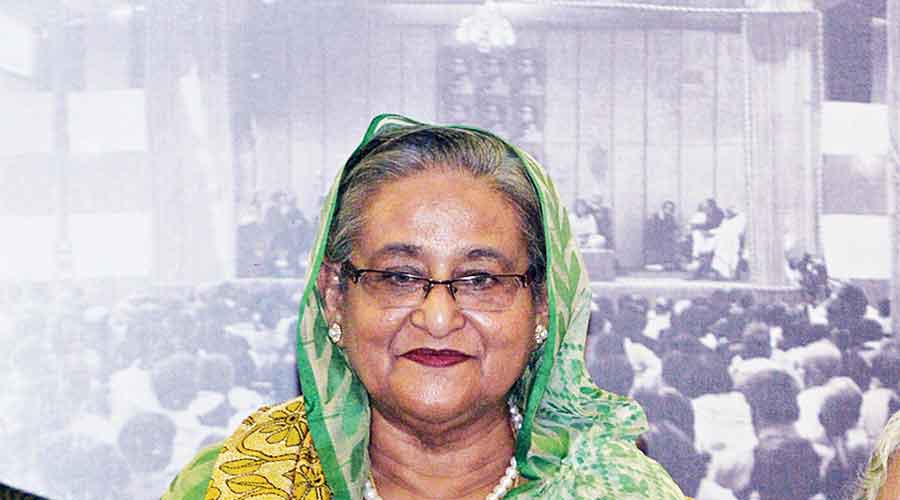The Sheikh Hasina government has proposed special tax incentives for corporate houses in Bangladesh that employ transgender persons, becoming South Asia’s first country to offer such an inclusive benefit to sexual minorities.
The proposal drew applause from one of the most deprived communities in Bangladesh and fuelled hopes that it would help break the shackles of centuries-old discrimination.
Part of the annual budget proposals tabled last Thursday by Bangladesh finance minister A.H.M. Mustafa Kamal, the plan envisages a tax rebate for employers who recruit 10 per cent of their total workforce, or more than 100 employees, whichever is lower, from among “third gender” (tritiyo lingo) persons.
“The rebate will amount to 75 per cent of the total salary paid to workers from the third gender, or 5 per cent of the payable tax, whichever is lower,” the finance minister of the Muslim-majority country said in his budget speech.
Unlike India, where the Supreme Court decriminalised consensual homosexual acts by striking down IPC Section 377 in 2018, homosexuality is illegal under Bangladesh law, a vestige of the British-Indian government’s Section 377 of 1860.
Discrimination against members of the lesbian, gay, bisexual, transgender and queer (LGBTQ) community has been rampant in Bangladesh, where homosexuality is taboo among conservative sections, and there have been several instances of arrests of lesbian or gay couples.
In April 2016, Xulhaz Mannan, the founder of Roopoban, Bangladesh’s first LGBTQ magazine, was killed in his apartment, along with a friend, by fundamentalists, which halted the community’s movement for sexual freedom in the country.
“Against this backdrop, the government’s decision to incentivise employment of the third gender in the private sector is indeed a big step for the community,” said Ho Chi Minh Islam, goodwill ambassador for transgender rights at No Passport Voice, an organisation that works for sexual minorities in Bangladesh.
According to Ho Chi Minh Islam, the fact that lawmakers had spoken about the “third gender” — “although I have a problem with the use of this phrase” — in Parliament was recognition of the community’s presence in Bangladesh.
In the absence of any census among transgender persons, there is no official statistics on the community. “Although there are estimates that range between 2 lakh and 5 lakh, the size of the community is much bigger…. We hope that the government will deliver on its promise of enumerating people who are neither male nor female,” said Ho Chi Minh Islam, who is also Bangladesh’s first transgender nurse in a private hospital.
Members of the LGBTQ community in India lauded the Hasina government’s move and said the Centre should take a lesson from Dhaka.
“The draconian Section 377 of the IPC has been done away with by the courts. There is also the Transgender Persons (Protection of Rights) Act. This means, on paper, the Government of India is saying that there is reservation for transgender people…. But the question is about implementation of the provisions,” said Bappaditya Mukherjee, convenor of the South Asian Youth and Queer Activists Network that works for gender and sexual minorities.
“What the Bangladesh government is doing is actually a step towards implementing (similar) provisions by incentivising employment of the transgender community. India should take a lesson from it, which will encourage others countries in the region to follow suit,” Mukherjee added.
Ho Chi Minh Islam said the success of the proposal would depend on a host of factors.
“First, the transgender community has to be counselled and nurtured so that they can take advantage of the provisions proposed in the budget…. Besides, we also have to meet the corporate sector and sensitise them about the benefits they can derive from such recruitments. We are planning to meet members of the chambers of commerce soon,” Ho Chi Minh Islam said.
The objective of empowering the marginalised transgender community, according to Ho Chi Minh Islam, would be fulfilled only with the support of the majority in the society.
“Whenever I have spoken about LGBT rights, there has been a backlash from fundamentalists in our country…. You never know how they will react to this proposal and there is every possibility of they hitting the streets for a repeal of the provision. So, the success of the proposal would depend on how the government wants it to be implemented,” Ho Chi Minh Islam said.










